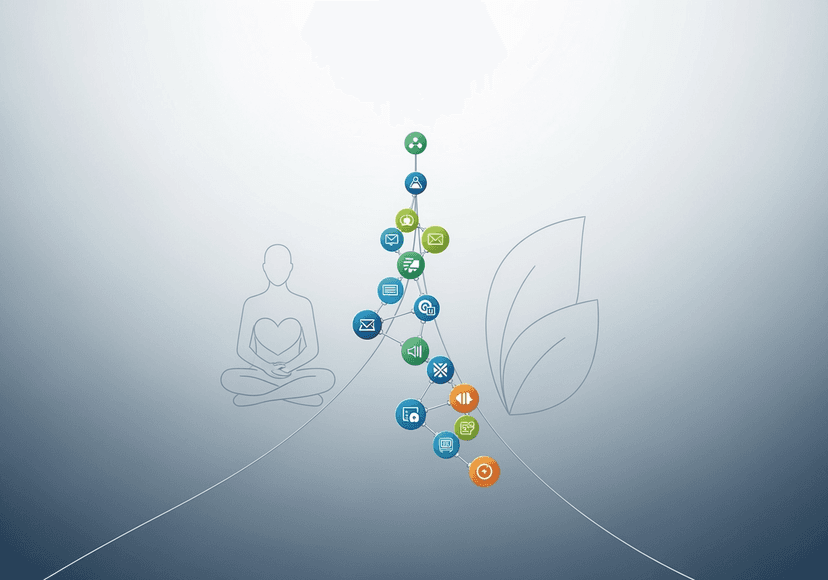
Integrative Medicine in Pancreatic Cancer Care: The Indian Approach
27 Nov, 2023
 Healthtrip Team
Healthtrip TeamPancreatic cancer is a devastating disease known for its aggressive nature and limited treatment options. In recent years, there has been a growing interest in integrative medicine as a complementary approach to conventional cancer care. Integrative medicine combines conventional medical treatments with evidence-based complementary therapies to provide a holistic approach to cancer management. In India, this approach is gaining traction in the treatment of pancreatic cancer, offering patients a comprehensive and patient-centered approach to care. In this blog, we will explore the Indian approach to integrative medicine in pancreatic cancer care and the various therapies and practices that are being incorporated into treatment plans.
Most popular procedures in India
Pancreatic Cancer
Before delving into the Indian approach to integrative medicine, it's essential to have a basic understanding of pancreatic cancer. The pancreas is a vital organ responsible for producing digestive enzymes and regulating blood sugar levels. Pancreatic cancer occurs when abnormal cells in the pancreas grow uncontrollably, leading to the formation of tumors. It is often diagnosed at an advanced stage, making it one of the deadliest forms of cancer.
Wellness Treatments
Give yourself the time to relax
Lowest Prices Guaranteed!

Lowest Prices Guaranteed!
Conventional Treatments
Conventional treatments for pancreatic cancer typically include surgery, chemotherapy, radiation therapy, and targeted therapy. While these treatments can be effective in some cases, they often come with significant side effects and may have limited success, especially in advanced stages of the disease.
Integrative Medicine in Pancreatic Cancer Care: The Indian Approach
Pancreatic cancer is one of the most aggressive and challenging forms of cancer to treat. Traditional treatments such as surgery, chemotherapy, and radiation therapy can be taxing on patients and may offer limited success, particularly in advanced stages of the disease. In response to these challenges, the Indian healthcare system has increasingly embraced integrative medicine as a complementary approach to enhance the quality of life and overall well-being of pancreatic cancer patients. This multidisciplinary approach combines conventional medical treatments with evidence-based complementary therapies, offering a holistic and patient-centered approach to care. In this detailed exploration, we will delve deeper into the key components and benefits of the Indian approach to integrative medicine in pancreatic cancer care.
1. Ayurveda: The Art of Holistic Healing
Ayurveda, deeply rooted in ancient Indian wisdom, offers a holistic approach to health and well-being. For pancreatic cancer patients seeking a comprehensive and patient-centered approach, Ayurveda is a fundamental component of integrative medicine in India.
- Emphasis on Balance: At the core of Ayurveda is the belief in achieving and maintaining balance within the body, mind, and spirit. This balance is essential for overall health, resilience, and the body's ability to heal.
- Individualized Treatment: Ayurvedic practitioners understand that each person is unique, and treatments are tailored to the individual patient's constitution, known as their dosha. The dosha classification helps determine the patient's physical and mental characteristics and guides the treatment plan.
- Dietary Modifications: Ayurveda places great importance on diet as a means of healing. Dietary modifications are a key aspect of treatment, with specific recommendations based on the patient's dosha. These dietary changes aim to nourish the body, support the immune system, and address any nutritional deficiencies that may be exacerbated by cancer or its treatment.
- Herbal Remedies: Ayurvedic treatments often incorporate herbal remedies, using a wide range of natural herbs and plants. These remedies are carefully selected to address specific health concerns, alleviate symptoms, and promote healing.
- Lifestyle Changes: Ayurveda encourages patients to make lifestyle adjustments that support their overall well-being. This may include changes in daily routines, sleep patterns, and stress management techniques.
- Quality of Life Enhancement: Beyond the physical aspects of treatment, Ayurveda also focuses on improving the patient's quality of life. This holistic approach aims to reduce discomfort, enhance emotional well-being, and offer a sense of control and empowerment during a challenging time.
2. Yoga and Meditation: Cultivating Balance and Resilience
Yoga and meditation, integral components of Indian integrative medicine programs, offer profound benefits for pancreatic cancer patients as they navigate the physical and emotional challenges of their illness.
- Stress Reduction: A cancer diagnosis and treatment can bring about significant stress and anxiety. Yoga and meditation practices provide powerful tools to reduce stress, promote relaxation, and improve mental well-being. Deep breathing exercises and mindfulness techniques help patients cope with the emotional aspects of cancer care.
- Physical Flexibility and Strength: Yoga postures (asanas) are designed to enhance physical flexibility, strength, and balance. For pancreatic cancer patients who may experience physical limitations due to the disease or its treatment, yoga can be particularly valuable in maintaining mobility and overall physical well-being.
- Pain Management: Managing pain is a critical aspect of cancer care. Yoga's gentle movements and stretching can alleviate discomfort and improve the patient's comfort level. Meditation techniques can also reduce the perception of pain and enhance the body's ability to tolerate it.
- Enhanced Quality of Life: Yoga and meditation contribute to an improved quality of life by promoting a sense of empowerment and control. Patients often report feeling more centered, calm, and optimistic as they engage in these practices.
- Emotional Resilience: Cancer can take a toll on emotional well-being. Yoga and meditation offer emotional support, helping patients process their feelings, reduce anxiety, and cultivate emotional resilience.
3. Nutrition Therapy: Nourishing the Body and Enhancing Immunity
In the realm of integrative medicine for pancreatic cancer care, nutrition therapy plays a pivotal role in optimizing the patient's overall health and well-being. By drawing from Ayurvedic principles, personalized dietary plans are meticulously crafted to address the unique needs of each individual.
- The Significance of Nutrition: Proper nutrition is undeniably crucial for all cancer patients. However, in the Indian approach to integrative medicine, it takes on a special significance. Nutritional therapy goes beyond merely providing sustenance; it serves as a foundational pillar for enhancing the body's immune system and bolstering its capacity to endure the rigors of cancer treatment.
- Ayurvedic Dietary Principles: The Ayurvedic approach to nutrition is deeply rooted in the belief that different foods have varying effects on the body and mind. This understanding is used to tailor dietary plans based on the patient's dosha (constitution) and the specific needs that cancer care demands.
- Personalized Dietary Plans: Ayurvedic practitioners work closely with pancreatic cancer patients to develop dietary plans that are highly personalized. These plans encompass a variety of factors, including the patient's dosha, the stage of the disease, the treatment regimen, and any symptoms or side effects experienced.
- Immune System Support: The nutritional therapy provided in this approach is not only about nourishing the body but also about fortifying the immune system. Cancer treatments can weaken the immune response, making patients more susceptible to infections and other complications. Through carefully selected foods and supplements, Ayurvedic nutrition aims to boost immunity and enhance the body's ability to fight the disease.
- Minimizing Treatment Side Effects: In addition to supporting the immune system, Ayurvedic dietary plans are crafted to minimize the side effects of conventional cancer treatments. This may involve strategies to alleviate nausea, improve digestion, and maintain optimal nutritional status throughout the treatment journey.
- Promoting Overall Well-Being: Beyond the physical aspects of nutrition, Ayurvedic principles also consider the emotional and mental aspects of eating. Encouraging mindful eating and the consumption of foods that promote mental clarity and emotional balance is an integral part of this holistic approach.
4. Naturopathy: Stimulating the Body's Innate Healing Power
Naturopathy, another significant component of integrative medicine in India, embraces the concept of stimulating the body's natural healing processes. Naturopathic treatments encompass various modalities, including hydrotherapy, acupuncture, and herbal medicine, all with the goal of minimizing the side effects of conventional cancer treatments and enhancing overall well-being.
- Holistic Healing: Naturopathic doctors approach cancer care from a holistic perspective, recognizing that the body has an innate capacity to heal itself when supported appropriately. They aim to address the root causes of health issues rather than merely treating symptoms.
- Hydrotherapy: Hydrotherapy involves the therapeutic use of water in various forms, such as hot and cold baths, steam treatments, and compresses. It is employed to alleviate pain, reduce inflammation, and enhance circulation, contributing to improved comfort and well-being during cancer treatment.
- Acupuncture: Acupuncture is a technique that involves the insertion of thin needles into specific points on the body. It is known for its effectiveness in pain management, reducing nausea, and promoting relaxation.
- Herbal Medicine: Herbal remedies are used in naturopathy to support the body's healing processes and minimize side effects. These remedies are carefully selected based on their potential to alleviate symptoms and improve the patient's overall quality of life.
- Individualized Treatment Plans: Naturopathic doctors work closely with pancreatic cancer patients to create individualized treatment plans that take into account the patient's specific needs, preferences, and overall health status. These plans are flexible and adaptable to the changing circumstances of cancer care.
- Collaboration with Conventional Care: Naturopathy is often integrated with conventional cancer treatments to provide a comprehensive approach to care. This collaboration can help patients better tolerate and respond to traditional therapies.
5. Mind-Body Therapies: Enhancing Balance, Relaxation, and Pain Relief
Mind-body therapies are integral to the Indian approach to integrative medicine in pancreatic cancer care. These therapies, which include acupuncture, acupressure, and Reiki, aim to harmonize the body's energy, promote relaxation, and alleviate pain. They play a vital role in managing symptoms and improving the overall quality of life for pancreatic cancer patients.
- Balancing Energy: Mind-body therapies are based on the concept that the body's energy flows along specific pathways or meridians. Disruptions in this energy flow can lead to physical and emotional imbalances. Therapies like acupuncture and acupressure work to unblock or balance the flow of energy, restoring harmony to the body.
- Acupuncture: Acupuncture involves the insertion of fine needles at specific acupuncture points along the body's meridians. It is known for its effectiveness in managing pain, reducing nausea, and promoting relaxation. For pancreatic cancer patients dealing with discomfort and treatment-related side effects, acupuncture can provide significant relief.
- Acupressure: Acupressure utilizes finger pressure instead of needles to stimulate acupuncture points. It is a non-invasive and gentle technique that can be used to manage nausea, relieve tension, and enhance overall well-being.
- Reiki: Reiki is a form of energy healing that involves the practitioner placing their hands on or near the patient's body to channel healing energy. It is believed to promote relaxation, reduce stress, and support the body's natural healing processes. Pancreatic cancer patients often find Reiki sessions to be deeply calming and comforting.
- Pain Management: One of the primary benefits of mind-body therapies is their ability to effectively manage pain, a common challenge in cancer care. These therapies can reduce the perception of pain and improve the patient's comfort level, allowing for a better quality of life.
- Complementary to Conventional Treatment: Mind-body therapies are typically used in conjunction with conventional cancer treatments, enhancing their effectiveness and minimizing side effects. The integration of these therapies into the treatment plan is done in collaboration with the patient's healthcare team.
6. Psychological Support: Nurturing Emotional Well-Being
Coping with pancreatic cancer is not just a physical journey; it's an emotional and psychological one as well. Recognizing this, integrative medicine programs in India offer essential psychological support through counseling and psychotherapy to help patients and their families navigate the emotional and psychological challenges of cancer.
- Emotional Challenges: A cancer diagnosis can evoke a range of emotions, including fear, anxiety, sadness, and uncertainty. Psychological support services provide patients with a safe space to express their feelings and learn coping strategies to manage the emotional impact of their illness.
- Counseling and Psychotherapy: These therapeutic modalities offer a structured approach to addressing emotional and psychological issues. Trained therapists work with patients to explore their emotions, develop coping skills, and create strategies for managing stress and anxiety.
- Family Support: Pancreatic cancer affects not only the patient but also their loved ones. Integrative medicine programs often extend psychological support to families, helping them understand and navigate the challenges of caring for a loved one with cancer.
- Enhanced Resilience: Psychological support services aim to enhance the patient's emotional resilience, providing them with the tools and resources they need to navigate the ups and downs of their cancer journey.
Integrative Oncology Teams: Collaborative Care for Better Outcomes
Specialized hospitals in India assemble multidisciplinary integrative oncology teams comprising oncologists, Ayurvedic doctors, nutritionists, yoga instructors, and other experts. These teams work together to create personalized treatment plans that address the physical, emotional, and psychological needs of each patient.
Benefits of Integrative Medicine
- Enhanced Quality of Life: Integrative therapies can effectively manage cancer-related symptoms such as pain, nausea, and fatigue, significantly improving the overall quality of life for patients.
- Improved Immune Function: Many integrative approaches aim to strengthen the immune system, which is crucial in supporting the body's ability to fight cancer and tolerate treatments.
- Personalized Care: Integrative medicine recognizes the uniqueness of each patient and tailors treatments to their specific needs, preferences, and constitution, providing a truly patient-centered approach.
- Stress Reduction: Mind-body practices, including yoga and meditation, have a proven track record in reducing stress and anxiety, contributing to better treatment outcomes and overall well-being.
- Symptom Management: Complementary therapies are effective in managing treatment-related side effects, allowing patients to better tolerate conventional treatments and maintain their daily activities.
In conclusion, the Indian approach to integrative medicine in pancreatic cancer care represents a holistic and patient-centric approach that recognizes the importance of treating the whole person, not just the disease. By combining the best of conventional medicine with complementary therapies deeply rooted in Indian traditions, patients can experience a comprehensive and tailored treatment plan that addresses their physical, emotional, and psychological needs. As research in this field continues to grow, integrative medicine is poised to play an increasingly vital role in the comprehensive care and support of pancreatic cancer patients, offering hope, relief, and an improved quality of life. Patients and healthcare providers are encouraged to explore these integrative options and collaborate to determine the most appropriate treatment plan based on individual needs and circumstances.
Related Blogs

How Healthtrip Ensures Quality & Safety in Cancer Treatment Procedures
Detailed guide on cancer treatment, featuring doctors, hospitals, risks, recovery,

End-to-End Logistics for Cancer Treatment with Healthtrip's Support
Detailed guide on cancer treatment, featuring doctors, hospitals, risks, recovery,

Healthtrip's Care Coordinators: Your Support During Cancer Treatment
Detailed guide on cancer treatment, featuring doctors, hospitals, risks, recovery,

Healthtrip's Care Coordinators: Your Support During Cancer Treatment
Detailed guide on cancer treatment, featuring doctors, hospitals, risks, recovery,

Top 5 Indian Hospitals for Cancer Treatment
Detailed guide on cancer treatment, featuring doctors, hospitals, risks, recovery,

Post-Cancer Treatment Diet and Lifestyle Tips
Detailed guide on cancer treatment, featuring doctors, hospitals, risks, recovery,










